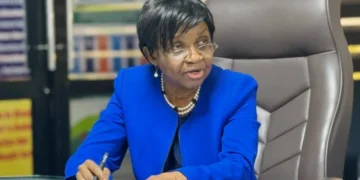By Isaac Nnamdi
Dr. George Nweke, former Rivers State Head of Service, on Friday, 28 February, peeled back what he described as the layers of deceit in Rivers State to reveal a sinister plot good enough to make a thriller movie. If the revelations are to be true, they didn’t just shake the very fabric of the nation, they unmasked a governor who had supposedly gone from chief security officer to chief saboteur, a wolf in sheep’s clothing whose supposed pity for Rivers State now seems little more than crocodile tears.
The picture painted by Dr. Nweke is one that chills the bones. Imagine, a scenario where all he alleged had come to fruition. The same hands entrusted with protecting Rivers State were allegedly plotting its destruction – not through negligence, but through deliberate, calculated acts of arson and economic sabotage. The assembly complex turned rubbles, residential quarters targeted, oil installations marked for destruction – these weren’t accidents waiting to happen, but disasters being meticulously planned.
What manner of leader plots the burning of his own house to spite his enemies? What sort of chief security officer allegedly conspires with militants to cripple the economy he has sworn to protect? These allegations were directed to the suspended Governor of Rivers State, Simi Fubara. The revelations suggest Fubara wasn’t just failing in his duties – he was actively working against them, turning the instruments of governance into weapons of political warfare.
Nweke has dared Fubara to deny the claims, as he vowed to provide solid proof as a direct witness to the alleged plots masterminded by Fubara.
This was the same Fubara who had many Nigerians sympathizing with him when President Tinubu declared a state of emergency in Rivers State. Were all those tears and protests nothing more than performance art? Was the supposed victim actually the architect of the crisis?
Dr. Nweke’s account forces us to confront uncomfortable truths about power and deception in our politics. It reveals how easily public sympathy can be manipulated, how quickly narratives can be inverted. Most disturbingly, it shows how the very institutions meant to protect citizens can be turned against them when placed in the wrong hands.
When a governor allegedly instructs his chief of staff to torch the hallowed chambers of the State Assembly, one expects such a scene to unfold in the pages of a dystopian novel, not in the oil rich heart of Nigeria. The Rivers State House of Assembly, a symbol of democratic deliberation, was reduced to smouldering ruins under the orchestration of Governor Siminilayi Fubara’s henchmen. A bag of money exchanged hands, a Judas kiss for democracy, and the deed was done. Had this been an isolated incident, one might have dismissed it as the reckless impulse of a desperate politician. But the governor, like a child playing with matches, allegedly eyed the legislators’ residential quarters next. Only the vigilance of Rivers’ youths and elders prevented another act of state sponsored vandalism.
The most chilling admission was that Fubara regretted that he hadn’t demolished the alternative hall where the lawmakers reconvened. Such is the mind of a man entrusted with the welfare of millions, a man who saw public infrastructure not as assets to nurture but as pawns in a game of political chess. Fubara, is this true?
If bringing down the Assembly was the opening act, the grand plot was far more diabolical. Dr. Nweke’s account paints Fubara as a puppet master with dreams far beyond Port Harcourt’s Government House. The governor allegedly boasted of using the Ijaws, his ethnic kin, to “decide” Nigeria’s next president. Not through ballots, but through the sinister leverage of oil pipelines. With his “brother” in charge of Bayelsa and himself as Rivers’ chief security officer, he purportedly envisioned a scenario where militant elements would be unleashed to cripple the nation’s economic jugular. Is this true again?
The blueprint looks reckless and wicked. Bomb oil facilities in non-Ijaw territories, Ogoni, Oyigbo, Ahoada, to create a smokescreen, then pivot the blame to a statewide unrest. The goal is to destabilise Tinubu’s government and force a political recalibration, with a northern president and an Ijaw vice-president as the prize. This was no mere political strategy; it was economic treason, a dagger aimed at the heart of Nigeria’s already fragile stability. One wonders what manner of leader contemplates such ruin for personal gain. A man who allegedly whispers to militants in shadowy meetings, who funnels state funds into the pockets of warlords, is not a governor, he is a warlord in a suit.
Politics, they say, makes strange bedfellows, but Fubara’s nocturnal alliances were stranger than fiction. The former Head of Service spoke of mysterious visits from Bauchi’s Governor Bala Mohammed and other shadowy stakeholders, each departure lighter in principle but heavier in cash. The governor’s sudden affinity for a northern presidential candidate raised eyebrows, but the real scandal was the haemorrhaging of Rivers’ treasury to fuel these clandestine alliances. Even the labour unions were not spared. The Rivers chapter of the Nigeria Labour Congress (NLC), traditionally the voice of the working class, was allegedly compromised, its leader dining at the governor’s table and leaving with more than just leftovers. If true, this is not just corruption, it is the bastardisation of a movement meant to shield the masses from the very exploitation Fubara was accused of enabling.
Against this backdrop of subterfuge, President Tinubu’s declaration of a state of emergency was not just justified; it was a masterstroke. The intelligence reports that reached his desk were not mere whispers; they were klaxons blaring of impending catastrophe. Rivers State was a keg of gunpowder, and Fubara was striking matches. Critics of the president’s decision, particularly those who rushed to condemn the state of emergency, now stand on shaky ground. Dr. Nweke’s revelations confirm what many suspected: Tinubu did not act on a whim. He acted to forestall anarchy. The six month suspension of Fubara and the Assembly, the appointment of a sole administrator, these were not the moves of an overbearing federal government but of a leader pulling the nation back from the precipice.
Yet, the battle is not over. The former Head of Service warns that the schemers are regrouping, their media machinations in full swing. The outcry against Tinubu’s intervention is not organic; it is the death rattle of a thwarted conspiracy. The sole administrator must tread carefully, for the snakes may have been scotched, not killed. In the end, Dr. Nweke’s press briefing was more than a confession; it was an act of courage. To stand before the nation and exposed such a web of deceit takes a spine of steel.
As for Fubara, his legacy is now etched in infamy, a man who mistook Rivers State for his personal fiefdom, who played with fire and got burnt. The president’s intervention was not just about restoring peace; it was about saving a state from its own governor. And for that, history will judge Tinubu kindly.
So far, Fubara has failed to issue any substantive response to the allegations leveled against him. His rebuttal was lacking in substance and conspicuously evaded the core accusations, despite his accuser’s explicit challenge to refute the claims, accompanied by a readiness to present corroborating evidence.
This is the same Fubara who, shortly after his suspension, cryptically instructed his supporters to standby for the next order. While the precise implication of his statement remains ambiguous, his statement bears a striking resemblance to his incendiary remarks last June directed at state assembly members, wherein he declared, they do not exist. Their existence is contingent upon his recognition.









































Discussion about this post